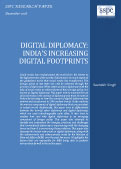Examining The Threat of Biochemical Attack During Kumbh 2019
In recent years, there appears to be increased interest in chemical and biological weapons (CBW) as a means for hostile state and non-state actors to improve their capabilities in carrying out proxy wars. Credible reports have indicated that the jihadi group, Islamic State of Iraq and Syria (ISIS), has acquired chemical weapons and is using them for war theatres in the Middle East. (The UNSC Press Release, November 7, 2017). This situation is very grave and a big threat to humanity across the globe.



